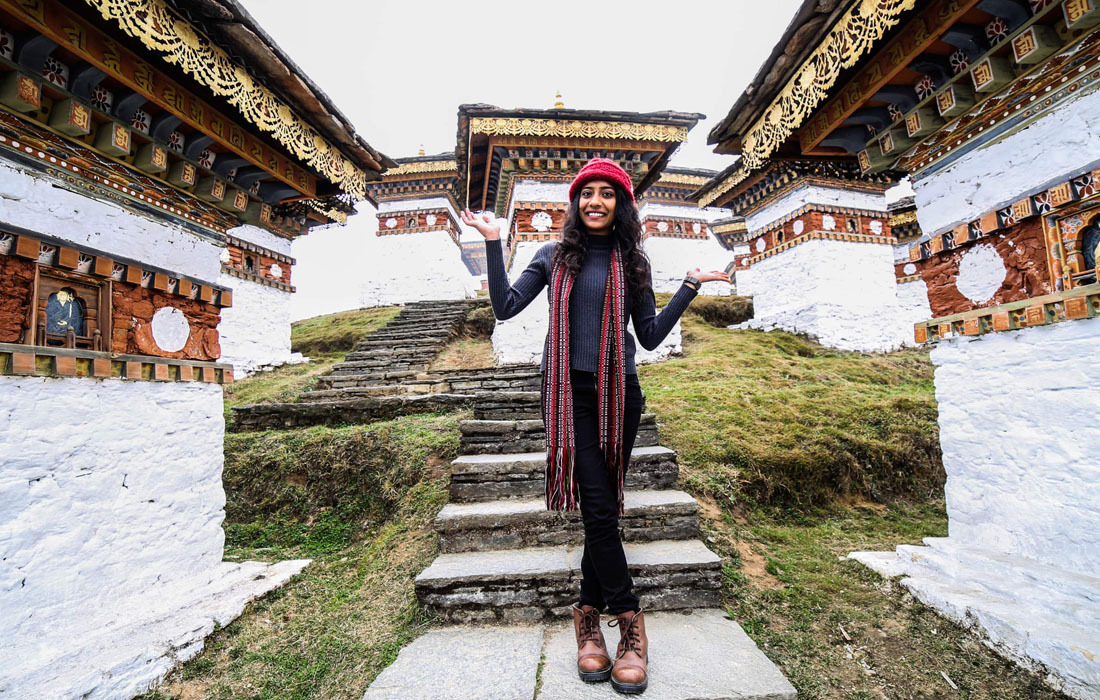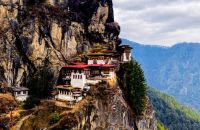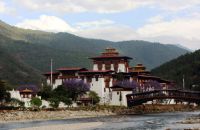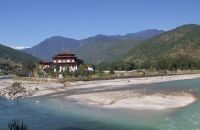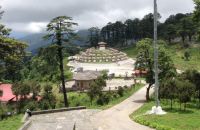Talk with our local travel specialist who can help organize your trip.
20 Essential Things To Know Before Visiting Bhutan
Traveling to Bhutan is a once-in-a-lifetime experience. Once cut off from the entire world due to its difficult geographical location, the country is a rarely explored gem. Located in the eastern Himalayas, this landlocked country is guarded by towering Himalayan mountains and covered by swathes of green forests. Bhutan, a land of Buddhist spiritualism, pristine nature, and rich culture, is a place where everything seems pure and unadulterated. If Bhutan is on your travel bucket list, here are 20 essential things to know before visiting Bhutan.
Table of Content
- Sustainable Development Fee
- Only One International Airport
- Two International Flights
- Passport
- Travel Insurance
- Clockwise Is The Acceptable Direction
- Local Etiquette
- Smoking Banned In Public Places
- Foreign Currency
- One Of The Safest Countries In The World
- Vaccinations
- Medicines To Carry
- Spicy Food
- Local Phrases To Break The Ice
- Bhutan Is Carbon-Negative
- Fully Organized Treks
- Tipping
- Be Culturally Sensitive
- Peak Seasons And Off-Seasons
- Independent Travel
1. Sustainable Development Fee
SDF, or Sustainable Development Fee, is a per-night, per-person fee that every tourist visiting Bhutan has to pay. The fee has to be paid while applying for the visa. As of 2024, the SDF has been fixed at USD 100 per day. Children aged 12 to 6 can avail of a concession of fifty percent, while children below the age of five are exempt from paying the fee. A sustainable Development Fee has been levied by the Bhutanese government to maintain its high-value, low-volume mode of tourism. Bhutan is a small country, and its government wants to save its culture and environment from over-tourism by trying to bring in responsible travelers who are prepared to explore the country by paying a hefty fee. The SDF funds the government's welfare schemes in the education, health, and tourism sectors.
2. Only one international airport
Bhutan has only one international airport, which is in Paro. Located in the midst of green hills and mountains, this is one of the most dangerous airports in the world. Flying into Paro is a thrilling and hair-raising experience as the plane navigates past high mountains and narrow valleys. Set amidst green hills, lush paddy fields, and tall traditional wooden houses, the international airport in Paro is one of the most picturesque international airports in the world.
3. Two International Flights
Because of its rough terrain, no international airlines are allowed to fly into Bhutan. Only two airlines, Royal Druk Air (which is the national flag carrier) and Bhutan Airlines, operate international flights from Bhutan. The pilots operating these flights are given special training, and only those who have completed the rigorous training are permitted to operate these flights. The international hubs from where you can catch a flight to Bhutan are Nepal (Kathmandu), India (Kolkata, Delhi, Guwahati, Bagdogra), Thailand (Bangkok), Singapore, and Bangladesh (Dhaka).
4. Passport
Your passport should also be valid for at least six months at the time of entering the country. Indian nationals can enter Bhutan without passports by showing their voter ID.
5. Travel Insurance
It used to be mandatory to have travel insurance to obtain a visa for Bhutan, but now things have changed. The government of Bhutan has canceled this requirement as of April 2024. It is no longer mandatory to have travel insurance in order to get a Bhutan visa. The government of Bhutan removed this requirement after COVID-19 to boost tourism and smooth the visa process for visitors.
However, this policy is liable to change, and Third Rock Adventures recommends tourists to get travel insurance if they are planning to travel to Bhutan. It is always safe to have insurance coverage for travel emergencies like baggage loss, illness, accidents, etc. Moreover, Bhutan has hilly terrain, and any nature tour or trekking adventure is fraught with natural hazards.
6. Clockwise is the acceptable direction
While walking around chortens or Buddhist stupas in Bhutan, go clockwise, keeping your right side close to the structure.
7. Local etiquette
Use your both hands while receiving or offering something. Don't sit with your legs stretched out toward people, especially the elderly. It is disrespectful to visit religious places without covering your body appropriately. Entry to monasteries is not allowed if you are dressed in skimpy or revealing clothes. Also, take off your hat while entering sacred temples or monasteries. Do not place your feet on religious structures like stupas or mani stones. Putting your feet on top of religious structures is seen as sacrilegious.
8. Smoking Banned in Public Places
Smoking is strictly banned in public spaces. While one is allowed to smoke, one should do it only at designated places. If you are a smoker you are allowed to bring two hundred sticks of cigarettes or fifty sticks of cigars with you while entering the country. However, you should declare these at customs during immigration.
9. Foreign Currency
USD, Indian rupees, AUD, CAD, Euro, GBP SGD & JPY currencies ARE accepted in Bhutan. One should also be informed that some denominations of the Indian currency are not accepted. Make sure to change your money and get local currency while entering Bhutan, as most small shops and restaurants accept only local currency. While card payment may be possible in Thimphu and Paro, other places in Bhutan only accept local currency. There are ATMs in all major towns and cities from where you can withdraw money using your debit card (MasterCard or Visa).
10. One of the safest countries in the world
Bhutan has a very low crime rate, which makes it one of the safest holiday destinations in the world. You can move around freely without worrying about theft or petty crimes. Bhutanese are devout Buddhists and believe in honest living. The country prioritizes the people's contentment and happiness over material wealth. That is why Gross National Happiness rather than Gross Domestic Product is used as a yardstick to measure Bhutan's progress and development. Bhutan is one of the rare countries where tourists feel safe and secure.
Featured Trips
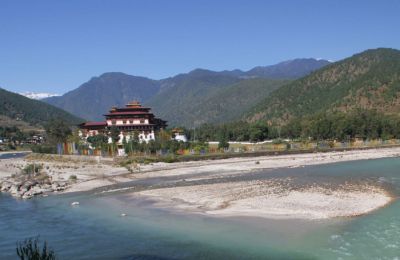
Bhutan Cultural Tour - 5 days
Bhutan Cultural Tour of 5 days lets you discover the rich Bhutanese culture. Visit ancient fortresses and Taktsang Monastery. Enjoy traditional hot stone bath.
Inquire Now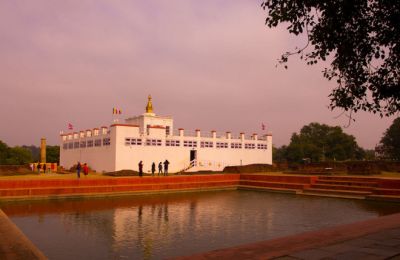
Nepal and Bhutan Buddhist Pilgrimage Tour - 12 days
Bhutan Buddhist Tour from Kathmandu-12 days is a sacred Buddhist Pilgrimage Tour to Nepal and Bhutan. Visit Lumbini, Lord Buddha’s birthplace and Tiger’s Nest.
Inquire NowWhere to travel next?
Get help from our travel specialists for holiday ideas that matches your interests.
11. Vaccinations
While there are no vaccination requirements to enter Bhutan, the government of Bhutan recommends travelers receive inoculations for typhoid, tetanus, hepatitis A and B, Japanese encephalitis, measles, and mumps before making their way into this tiny Himalayan country. If you have already taken these shots ask your physician whether you should take a booster shot.
12. Medicines to carry
Include a small medical kit in your packing list where you can pack your prescribed medicines (if you are taking any) and some medicines for common illnesses. Include Diamond if you have a high-altitude trek planned. Antibiotics, medicines for the common cold, diarrhea, motion sickness, painkillers, etc. should be in your kit. Also, include a mosquito or bug repellent and sunscreen lotion or cream if you plan to travel during the warmer months.
13. Spicy Food
In Bhutan, chili is regarded as a vegetable. There are dishes made entirely of chili, which the Bhutanese love. The national dish of Bhutan is‘Ema Datshi’, which is a dish prepared with hot chili peppers and cheese. The Bhutanese use a lot of peppers in their local cuisine. Sobe careful while trying out local dishes. If you are not used to spicy food you will likely end up with a flaming mouth and gut while trying the local Bhutanese cuisine.
14. Local phrases to break the ice
Learn a few phrases of the local language (Dzongka) to break the ice while trying to connect with the locals. Learn simple terms like 'hello', 'thank you', 'what's your name?', etc. to communicate with the locals. Kazuzangpola (hello), Kadrinchhey (thank you), Tashi Delek (good luck), Na gi sen gachi mo? (what is your name?), Zhimbay (delicious), and Ani gadem chi mo? (how much is it?) are some of the terms in Dzongkha that you may find useful while in Bhutan.
15. Bhutan is carbon-negative
In this era of global warming and climate change catastrophes, Bhutan is a glowing example of how a country can be carbon-negative by implementing environment-friendly policies. Bhutan, Panama, and Suriname are only three countries on earth that are carbon-negative. These countries store more carbon dioxide than they emit and release more oxygen into the atmosphere. Bhutan has been able to achieve this by keeping more than seventy percent of its land area covered by forests.
The Bhutanese government has mandated that sixty percent of the country’s land area should always be covered by forests. Deforestation for agriculture and logging is prohibited or tightly monitored in most parts of Bhutan and hydropower is used to generate electricity.
16. Fully Organized Treks
If you are planning a multi-day Himalayan trek in Bhutan, then you can expect a unique trekking experience. In case you have trekked in neighboring Nepal and expect the same kind of experience and amenities on the trail, then you are in for a surprise. Unlike in Nepal, where trails are dotted with villages and teahouses at specific points that offer lodging and meals to trekkers, the trekking trails in Bhutan are very isolated and wild. The paths weave past pristine forests with no human habitation for miles on end. The company you book your trek with will arrange the logistics for your trek (meals, tents, etc.).
A retinue of pack animals, cooks, kitchen helpers, and guides will accompany you during your trek. The mules will carry your luggage, rations for the whole trek, utensils, stoves, and tents required for camping. The local crew will be in charge up of setting up camp and preparing food. Each day, you will be served three meals, with snacks in between.
17. Tipping
The service providers appreciate it when they receive tips from customers. If you are happy with the service, you can tip the staff at hotels, restaurants, or cafes. If you are trekking, tipping the local crew after the trek will be appreciated. Tipping one's guide and driver after the end of one's tour is also part of travel courtesy(not mandatory, but travelers do it to show their appreciation). There is no set amount for tipping. You can tip as per your budget.
18. Be Culturally Sensitive
Bhutan is a unique country, and often you will experience and see things that are culturally different from what you are used to. Erotic carvings and paintings are part of tantric Buddhist art and can be seen adorning some monasteries or chortens. The male phallus, which is regarded as a fertility symbol and a sacred sign to ward off negative energies, also adorns the walls of Bhutanese homes and holy places. Try to be respectful and do not act scandalized or laugh at these symbols while on your tour.
19. Peak seasons and off-seasons
The peak seasons when tourists visit Bhutan are spring (March to May) and autumn (September to November). These seasons are ideal for traveling in Bhutan, as the weather remains stable and pleasant. You can expect light rain and an occasional thundershower during the spring and early autumn. Summer (June to August) is when the monsoon starts and the country receives the maximum amount of rainfall. Torrential rain and thunderstorms are common during the summer season, and for this reason, tourists choose to stay away from Bhutan during this season. Winter in Bhutan can be dry and cold. Some high-altitude areas remain snow-covered during the winter. It is important to pack warm clothes if you are planning to travel to Bhutan during the winter season. Bhutan is open to tourists year-round, so you can plan your vacation at any time of the year. During the off-season, you may face some weather-related issues, but on the bright side, you can avail of some off-season discounts at hotels.
20. Independent Travel
Is independent travel allowed in Bhutan? While some websites claim that independent travel is finally possible in Bhutan, it is actually not so. After COVID-19, you are allowed to book your own accommodations, but independent travel throughout the country is not permitted. While restrictions for independent tourists have been lifted in some parts of Paro and Thimphu, you will still need to have a local Bhutanese guide with you when visiting cultural sites and exploring other parts of Bhutan. Independent trekking is still not allowed, and you will have to book your trek with a trekking agency in case you wish to hike through Bhutan's walking trails. The same goes for other activities like mountain biking, motorbiking, bird watching, wildlife excursions, etc.
Final Note
Bhutan, with its daily fee (SDF), can be an expensive destination for tourists, especially budget travelers and backpackers. But the country is one of a kind, and a visit to this unique Himalayan kingdom is guaranteed to be a once-in-a-lifetime experience. You will enjoy exploring this country if you love nature and Buddhist art and culture. In this day and age where modern inventions and habits are making people forget and let go of their age-old customs and traditions, it is refreshing to see the Bhutanese people preserve and nurture their cultural heritage with pride. Bhutan is your ideal destination if you wish to escape from the chaos and stress of modern life and surround yourself with the peaceful vibes of nature. With more than seventy percent of the country surrounded by forests, there is no destination like Bhutan that can make you connect with nature and recharge your inner batteries.
But before booking your trip to Bhutan, do make sure to take note of the ‘20 Essential Things To Know Before Visiting Bhutan’.
Where to travel next?
Get help from our travel specialists for holiday ideas that matches your interests.
- Written by: Naba Raj Amgai
Updated: Jun, 27, 2024

